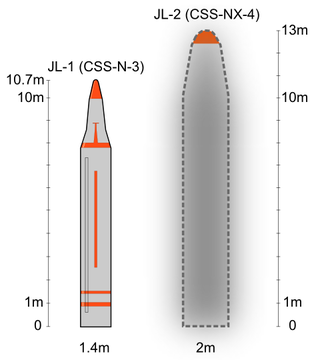Top Qs
Timeline
Chat
Perspective
JL-1
Submarine-launched ballistic missile From Wikipedia, the free encyclopedia
Remove ads
The Julang-1 (Chinese: 巨浪-1; pinyin: Jù Làng Yī; lit. 'Huge Wave-1', also known as the JL-1; NATO reporting name CSS-N-3) was China's first generation nuclear submarine-launched ballistic missile (SLBM). According to a US Department of Defense report in 2011, the operational status of the JL-1 was "questionable".[1]
Remove ads
Remove ads
History
Research and development began in 1967 and detailed design in the early 1970s, with a first land launch 30 April 1982 and a sea launch from a Project 629A (Golf-class) submarine on 12 October 1982. The general designer of the missile was Huang Weilu,[2] and Chen Deren (Chinese: 陈德仁, 1922 – 21 December 2007) served as his deputy. The missile was assembled at Factory 307 (now Nanjing Dawn Group [南京晨光集团]).[citation needed]
The JL-1 was deployed on Xia class submarine in 1986. The Type 092 Xia class nuclear submarine has 12 launch tubes.[citation needed]
The JL-1 was initially tested and deployed on the PLAN's modified Golf class SSB. The Golf has since been modified again for further testing of other missiles, such as the JL-2, which has test-launched multiple times with varying levels of success.[citation needed]
The DF-21 appears to be a land-based version of the JL-1. As of 2018, the JL-1 and its warheads are believed to have been retired and dismantled.[3]
Remove ads
See also
References
Wikiwand - on
Seamless Wikipedia browsing. On steroids.
Remove ads

